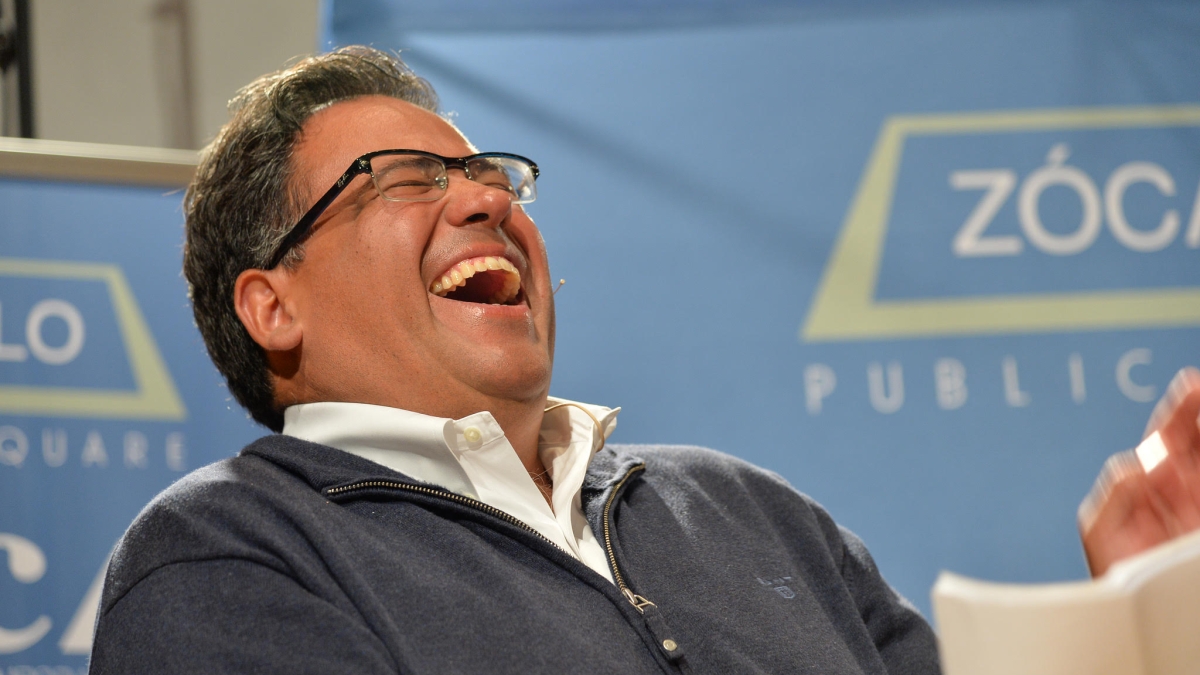Fifteen years ago, when Gregory Rodriguez first conceived of the idea that would become Zócalo Public Square, he could not have imagined what it would become.
In 2002, a tasteless remark by a guest at a “snooty” L.A. gathering of his writing peers would spark inspiration in Rodriguez that would change the direction of his life.
While attending the networking event — a rare activity for the otherwise solitary writer — Rodriguez was jokingly asked in front of a collection of strangers, not about the book he was writing or his latest intellectual pursuits, but whether he had been invited "under the Mexican quota.”
He left the event that afternoon frustrated by the experience and determined to create a space where people from diverse backgrounds, experiences and intellectual disciplines could come together to discuss ideas and make connections.
That space would become known as Zócalo Public Square. “The name Zócalo was meant to convey that the organization would be all about openness and generosity and inclusion,” Rodriguez noted. “I felt the symbolism of a grand, all-embracing central plaza — the type of public space many of us long for in America.”
It would operate under a specific set of tenets: events would be free to the public and everyone would be welcome to participate; ideas would be exchanged rather than advocated for; receptions would include complimentary refreshments and engaging speakers; and there would always be music.
What began as a simple lecture series — supported by Rodriguez and his traveling boom box, poster and reservation list — has blossomed into a thriving, innovative journalism and media organization, now a creative unit of Arizona State University.
Since its founding in 2003, Zócalo has presented 565 events, featuring 2,230 speakers in 23 cities, seven states and six countries. In addition to convening intellectually engaging events, Rodriguez and his staff publish over 500 original articles a year and syndicate to 280 media outlets worldwide, including USA Today, the Chicago Tribune, the Houston Chronicle, Smithsonian Magazine and The Singapore Straits Times.
The organization also presents an annual book prize to the authorThis year’s 8th annual Zócalo Book Prize was awarded to Michael Ignatieff, author of “The Ordinary Virtues: Moral Order in a Divided World.” Ignatieff will accept his award and give a lecture at an event in Los Angeles on May 22. whose book best enhances our understanding of community and the forces that strengthen or undermine human connectedness.
The Zócalo model of ideas journalism — examining essential questions in an accessible, open-minded and democratic spirit — has allowed the organization to thrive in an increasingly turbulent media landscape within a politically polarized world. The innovative organization seeks to cut through perceived geographic, social and intellectual boundaries to create experiences and knowledge that reflect the true diversity of the country.
“Amid these increasingly divisive times, Zócalo has created a space where people from all walks of life can come together and engage in thoughtful dialogue and the civil exchange of ideas,” said ASU President Michael Crow. “They join ASU as a place to share knowledge, challenge assumptions and find common ground on the important issues facing our world.”
In 2011, ASU and Zócalo entered into a formal partnership. Seven years later, Zócalo is now a creative unit of ASU, and together, the organizations are leveraging their strengths in support of a shared vision of inclusion, discovery and the pursuit of knowledge.
On Friday, April 6, Zócalo celebrated its 15th anniversary in Los Angeles, with, appropriately, a party. And while Rodriguez didn't bring the boom box along, the event’s principles remained the same: everyone was welcome, judgment was left at the door, and the drinks and music were free.
Top photo: Gregory Rodriguez at a Zócalo Public Square event.
More Law, journalism and politics
Law experts, students gather to celebrate ASU Indian Legal Program
Although she's achieved much in Washington, D.C., Mikaela Bledsoe Downes’ education is bringing her closer to her intended destination — returning home to the Winnebago tribe in Nebraska with her…

ASU Law to honor Africa’s first elected female head of state with 2025 O’Connor Justice Prize
Nobel Peace Prize laureate Ellen Johnson Sirleaf, the first democratically elected female head of state in Africa, has been named the 10th recipient of the O’Connor Justice Prize.The award,…

Native Vote works to ensure the right to vote for Arizona's Native Americans
The Navajo Nation is in a remote area of northeastern Arizona, far away from the hustle of urban life. The 27,400-acre reservation is home to the Canyon de Chelly National Monument and…
